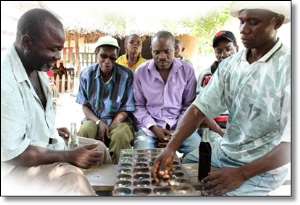
Africans familiar with the board game 'Bao' may not be surprised at the recent news that the continent lost over USD 1.4 trillion in illicit cash outflows in the years 1980 - 2009. In moves similar to those done in the 'Bao' board game, the continent is robbed of trillions of dollars through a coalition of evil that brings together African elites and elites from developed and emerging economies. In addition, the continent's resources are continuously 'captured' by outsiders and blocked from reaching and benefiting Africans.
An opponent in the 'Bao' game is defeated by capturing all the 'seeds' (called 'kete') from the front row of the four row game. The opponent can also be defeated by being barred from making a move. In the global board game, Africa demonstrates inability to prevent capture and make strategic moves.
At a recent forum for East African thought leaders held in Kampala, Mr. Monday Likwepa (President, Tanzania Bao Game Federation) brought to life the secrets of the 'Bao' game. He demonstrated how the 'Bao la Kiswahili' played a crucial role in evolving strategies to survive or deal with occupying civilizations in East Africa's coastal towns. The game trained future leaders in soft skills and strategic thinking that enabled Zanzibar people to contend against the Oman Arabs domination. The skills also enabled Tanzanians on mainland Tanzania to assert themselves against the British.
Mr. Likwepa shared insights on how drumbeats were also used to mobilize Africans to resist colonialism. He pointed out that the power of the famous WaZaramo's mdundiko drums. He argued that the mdundiko beats are irresistible.
Thousands of miles away in Berlin, a famous Swedish novelist Henning Mankell argued at a forum of young global leaders that 'if you do not join Africans in their dance, you probably may never know Africa!' In the context of the resurgent competition for Africa's attention between the West and the East: which of the two will dance to African drums?
East Africans have played 'Bao' with the Portuguese, Arabs and Westerners. The Asiatic East is back on the board game. The Arabs and the West did not dance to African drums. They brought their own drums and proved to be good at 'Bao;' capturing or simply blocking Africans from making a move. The West's skills in the 'Chess' game came in handy.
Africans have endured episodes of slavery, conquest, colonization and exploitation through neocolonialism. The quest to modernize the continent by the West has left the African people stuck and unable to make a move on the global board game. The continent wallows in subsistence and is unable to utilize the vast natural resources to improve the well being of its people. Will the East dance to African drums?
Having surrendered its drums and board games, Africa continuously battles with international institutions such as the World Bank and the International Monetary Fund to evolve its policies. The East now largely signified by China kept its drums intact notwithstanding its interactions with the West and successfully evolved from donor driven initiatives to become donors. Africa, on the other hand, is still bogged down with dependency on foreign aid. The Chinese have louder drums and a board game called 'Go.' The Chinese "Go" is supposed to compete against Africa's submerged and almost forgotten game of 'Bao.' African drums such as 'Isukuti' and 'mdundiko' previously demonized by the West are to confront their Chinese equivalent.
Africans should revive the irresistible mdundiko and the "Bao" if they have to evolve a strategy to engage the East and the West. Without the continent's loud and clear drums, it will be difficult to expect others to dance to the beats. Africans additionally risk 'Kete' status to be played on the global board game unless investments are deployed in the indigenous games of strategy.
By James Shikwati
The author [email protected] is Director of Inter Region Economic Network and Publisher, The African Executive Magazine




 This IMANI job no dey pap; the people you are fighting for are always fighting y...
This IMANI job no dey pap; the people you are fighting for are always fighting y...
 Prof. Naana Opoku-Agyemang has changed; you can see a certain sense of urgency –...
Prof. Naana Opoku-Agyemang has changed; you can see a certain sense of urgency –...
 MFWA Executive Director slams Akoma FM for engaging in ‘irresponsible’ media pra...
MFWA Executive Director slams Akoma FM for engaging in ‘irresponsible’ media pra...
 ‘Women must become millionaires too’ — Prof Jane Naana on establishment of Women...
‘Women must become millionaires too’ — Prof Jane Naana on establishment of Women...
 Some believe only in Ghanaian votes, not Ghana — Kofi Asare jabs politicians
Some believe only in Ghanaian votes, not Ghana — Kofi Asare jabs politicians
 Plan to make BEST sole aggregator of Sentuo Oil Refinery will create market chal...
Plan to make BEST sole aggregator of Sentuo Oil Refinery will create market chal...
 2024 elections: I can't have the man I removed from office as my successor — Aku...
2024 elections: I can't have the man I removed from office as my successor — Aku...
 2024 Elections: Immediate-past NPP Germany Branch Chairman garners massive votes...
2024 Elections: Immediate-past NPP Germany Branch Chairman garners massive votes...
 Gov’t focused on making Ghana energy self-sufficient, eco-friendly – Akufo-Addo
Gov’t focused on making Ghana energy self-sufficient, eco-friendly – Akufo-Addo
 April 25: Cedi sells at GHS13.74 to $1, GHS13.14 on BoG interbank
April 25: Cedi sells at GHS13.74 to $1, GHS13.14 on BoG interbank
